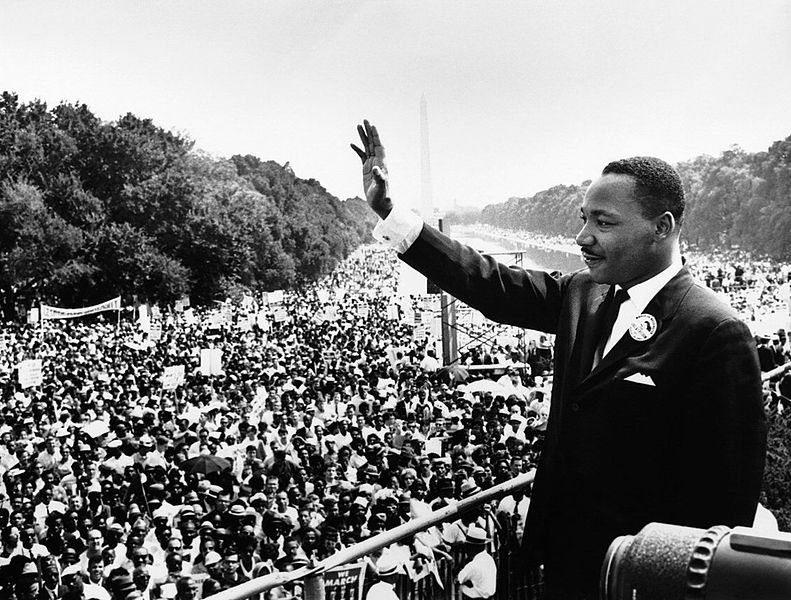On Saturday, Chestertown re-enacted the 50th anniversary of the March on Washington, where on a broiling August day in 1963 nearly 300,000 gathered at the Lincoln Memorial to hear Dr. Martin Luther King, Jr., a 34-year-old minister from Atlanta, secure his place in history as the founding father of equality.
The re-enactors marched from the Grand Army of the Republic Post on Queen Street (built by Union Army Veterans of the United States Colored Troops after the Civil War) and finished at the Garfield Center’s Prince Theatre on High Street for a night of remembrance, celebration, and a call for continued vigilance.
In the video below, the Pilgrim Travelers bring the Prince to its feet with a performance of Sam Cooke’s, “Change Is Gonna Come.”
On the day of King’s speech, the Prince Theatre was four years away from ending segregated seating, and Stam’s Drug Store across the street had removed the stools at their lunch counter the year before to deny seating to the Freedom Riders — who peacefully invaded Chestertown to demand an end to segregation.
“I went to a movie at the Prince with a friend who was told she had to sit in the balcony, so we sat together there,” said Leslie Raimond, executive director of the Kent County Arts Council, and a student at Washington College at the time.
The diverse crowd that stood before King on Aug. 28, 1963 had arrived in DC under entirely different circumstances. Whites had made their journey with relative ease and carte blanche access to restrooms, hotels, and restaurants that African-Americans citizens were denied.King said he came to the Lincoln Memorial to “cash a check” a “promissory note” that guaranteed all citizens the social and economic profits established in the Constitution.
King made it clear that the white majority’s legacy of brutality and discrimination against people of color would be challenged long into the future.
He would live to see the Civil Rights Act of 1964 and Voting Rights Act of 1965 signed into law, but LBJ would sign the Civil Rights Act of 1968 in the days that followed King’s assassination.
Kent County Commissioner William Pickrum, who was among the early African-American recruits to break the color barrier in the officer ranks of the US Coast Guard, said that laws being written by some former Jim Crow states in the south “are sending a clear message that the struggle for equal representation in the American process has a long way to go.”
In the video below, Pickrum connects the Civil Rights Movement of 50 years ago with the current struggle to beat back state sponsored voter supression laws moving through legislatures in six southern states.



![Paul Schutzer, [Crowd at mall in front of Lincoln Memorial, March on Washington], August 28, 1963](https://cs.communitynewspaperproject.org/files/2013/08/Paul-Schutzer-Crowd-at-mall-in-front-of-Lincoln-Memorial-March-on-Washington-August-28-1963.jpg)
joe diamond says
The commemoration in D.C. didn’t go off without a few snags.
Fifty years ago there were still vestiges of Jim Crow and Separate but Equal accommodation around the country. These were obstacles that were overcome on the way to Washington at that time. In the second term of the first African American President of the United States……………..;fifty years into the dream……….the mutts struck again! Anyone attempting to go into the mall to hear the president was searched by Secret service folks, assisted by Homeland security and my personal fav, TSA. People passed out in the heat and had to be transported away from the mall to aid stations. This in the name of national security.
Whatever number was reported to have attended is ,therefore, low because of the many thousands who waited to be searched prior to standing on the grass between the capitol building and the Lincoln Memorial who never made it. News account available.
My country tis of thee, sweet land of. . .
Joe
mary Wood says
Chestertown’s March brought back memories for those of us who were there at that outpouring of fellowship and patriotism. I congratulate all those who worked to make it happen on a much smaller scale, but with lots of heart: The library, The Arts Council,C.V.Starr Center,the MLK Breakfast Committee,G.A.R. and the Garfield Theatre and many others who sang and read.